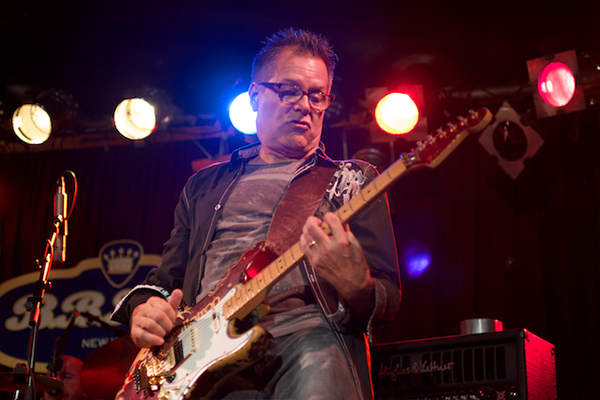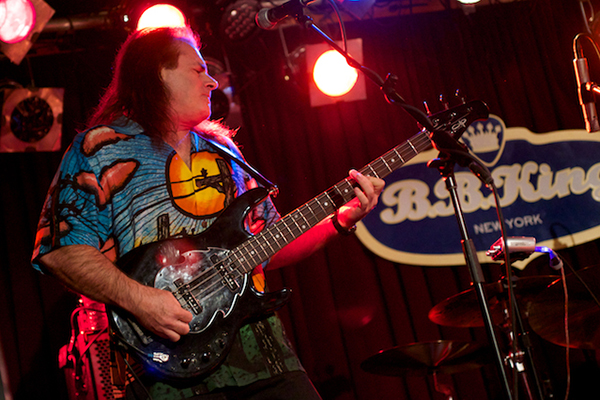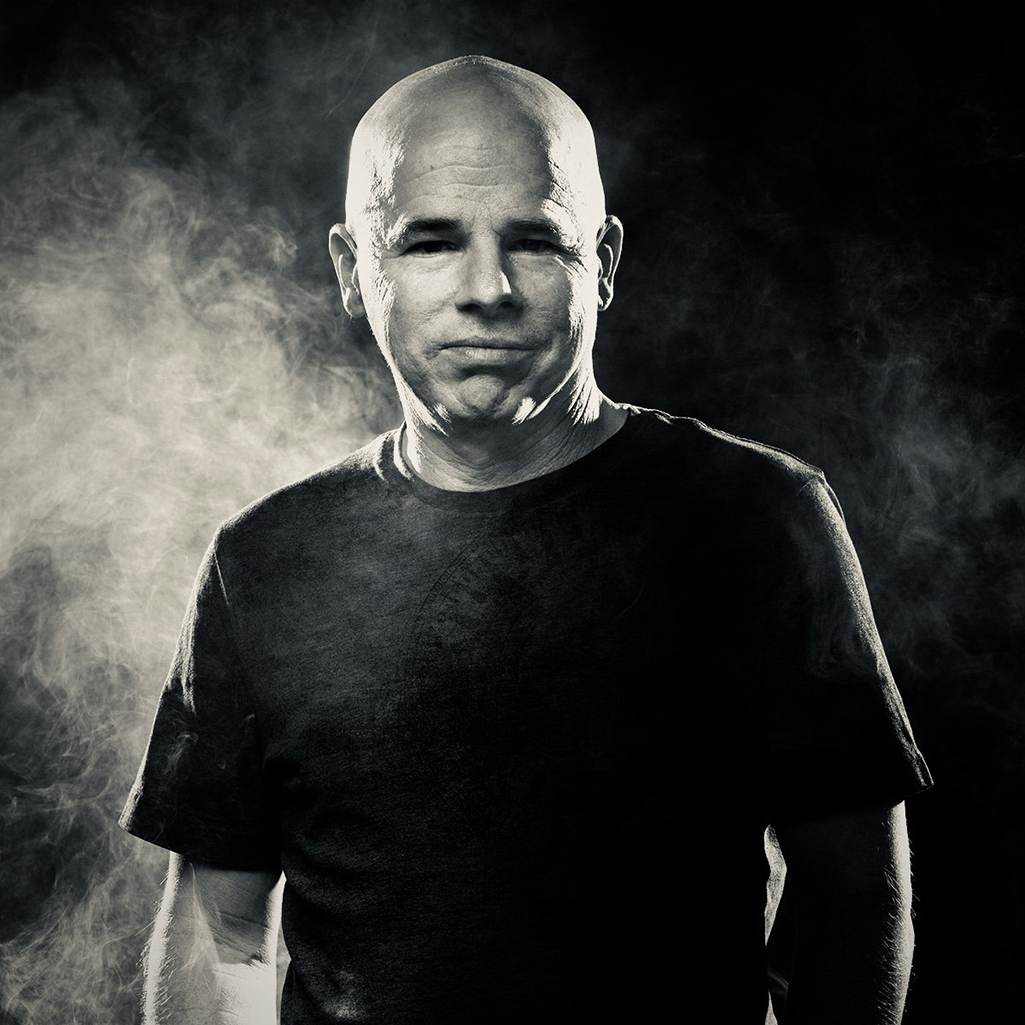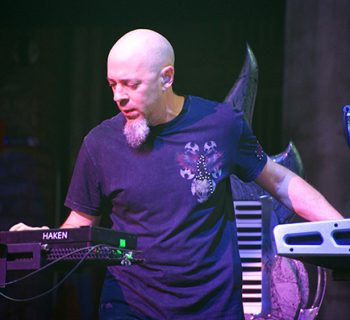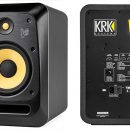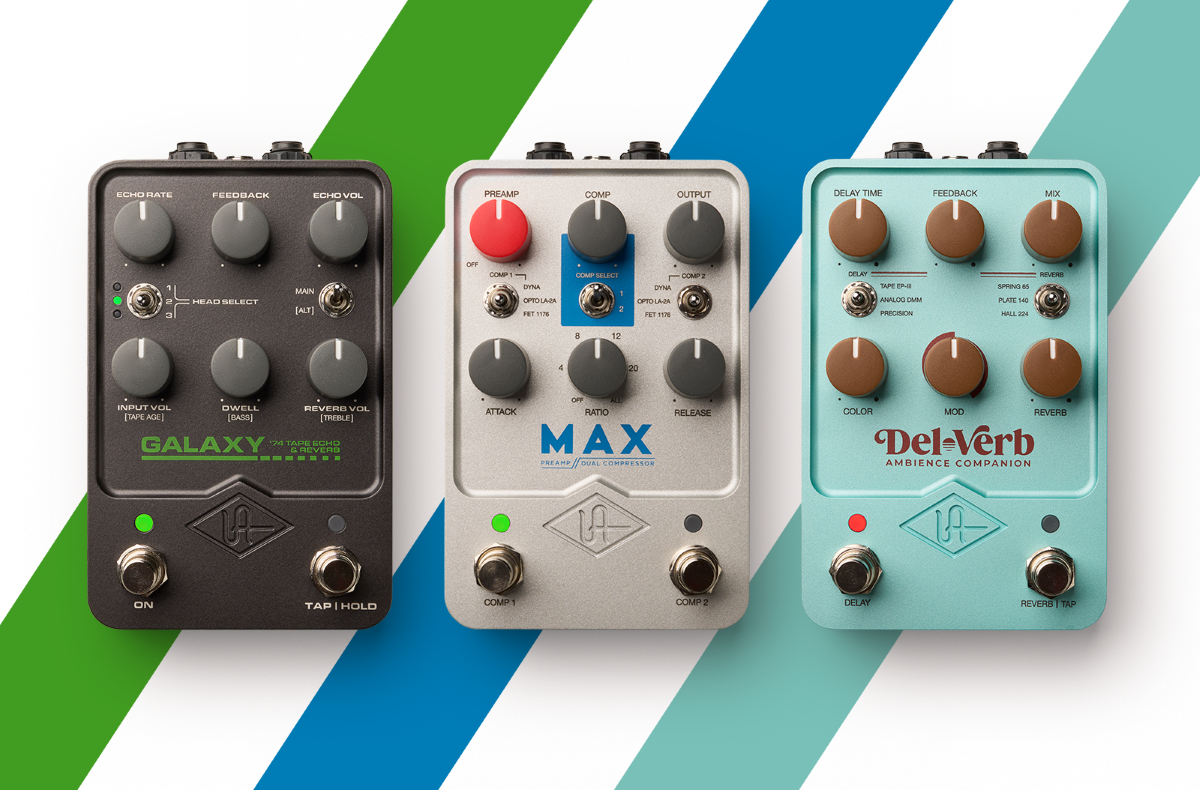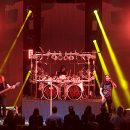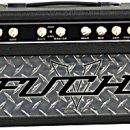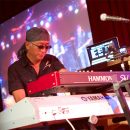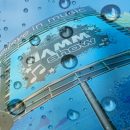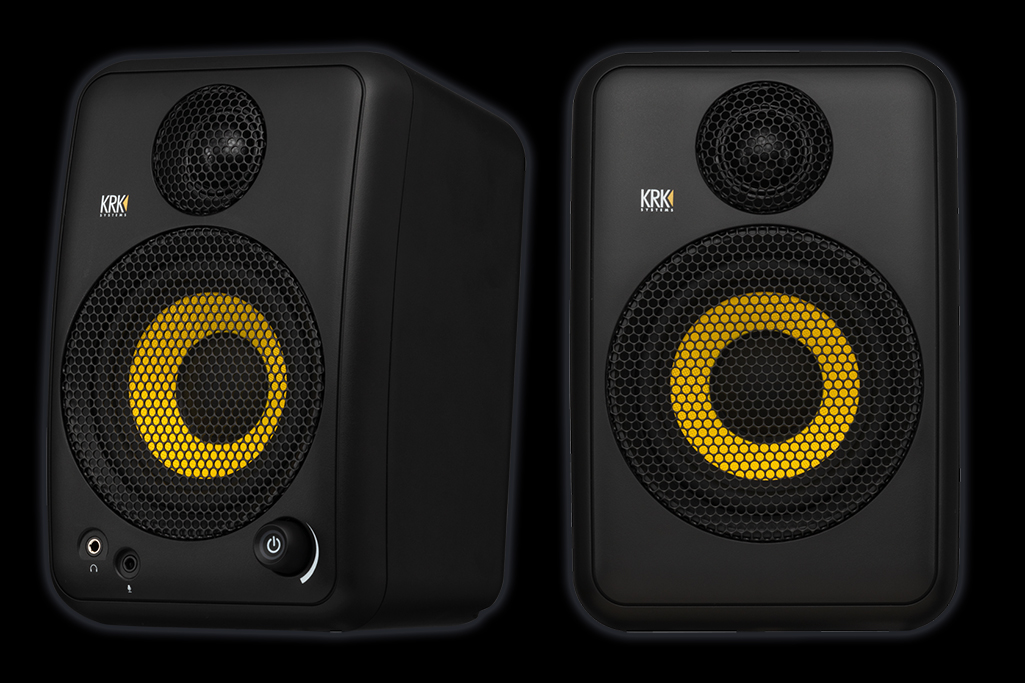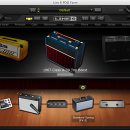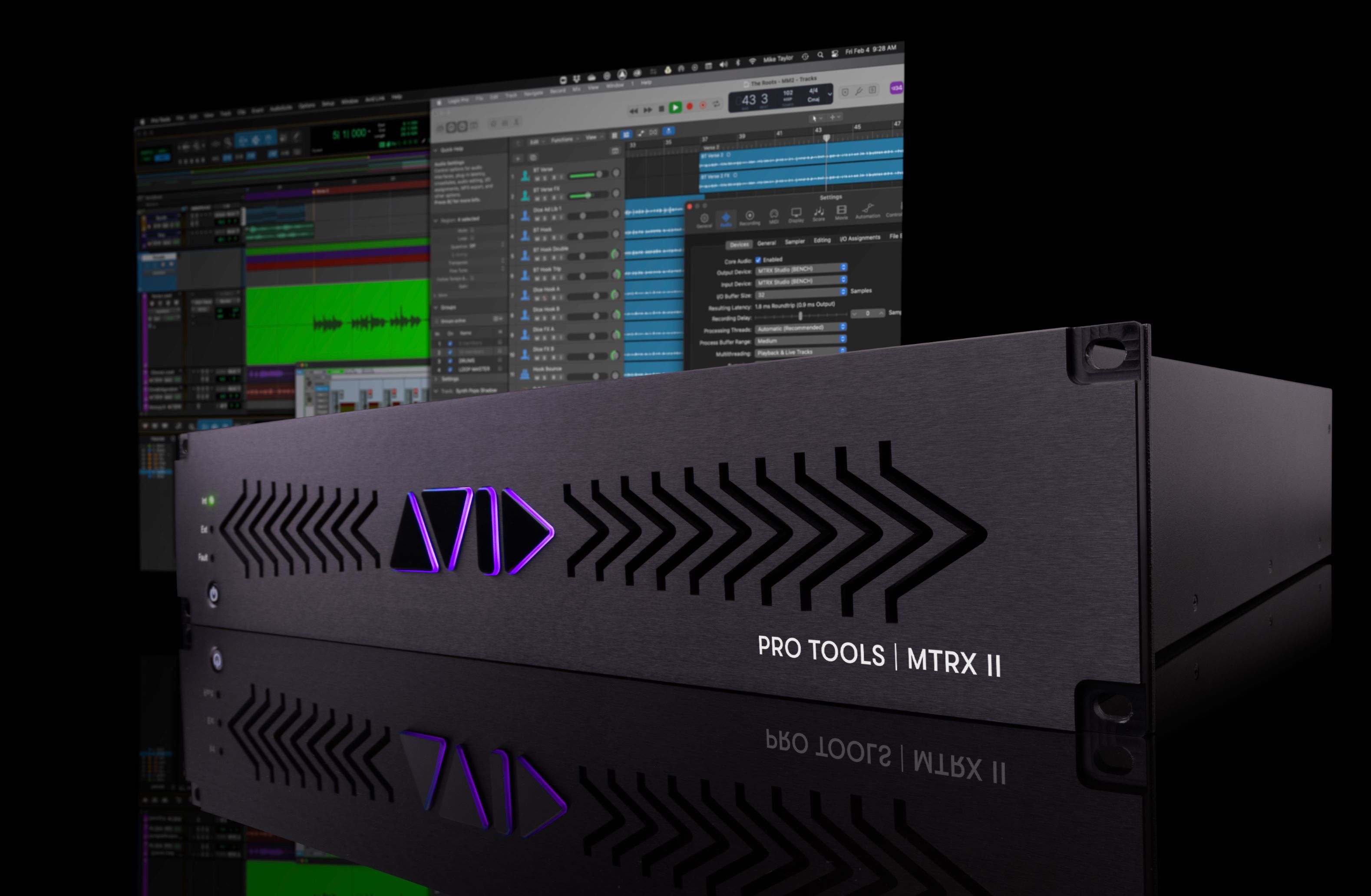Mostly, I like playing songs with big guitar solos in them.
MPc: So, Spock’s Beard is a band that’s undergone a lot of evolution over the years.
AM: Yeah, it’s one of those things, you know, if you want to keep going, you got to keep changing.
MPc: Looking back at the beginning, did you and your brother have some sort of intense musician’s rivalry growing up?
AM: Oh, yeah, totally. And that’s how we all learned how to play, because there were three of us brothers, so we all started to learn to play at the same time. One guy would learn how to play something and, goddammit, I want to learn how to play it, too, you know? So it was total sibling rivalry… fueled the whole thing for a long time.
MPc: And then years later, you and Neal decided to form a band.
AM: Yeah, and he said, hey, you want to do this band thing? And I went, oh, god, are you kidding me? Again? Jesus. You know. [laughs] Because we’d been in a bunch of bands that never went anywhere. I didn’t really want to do it, but… I don’t know… he talked me into it.
MPc: Who’s idea was the name?
AM: Well, it was sort of a running gag that we had, you know? It was just sort of a running joke. If something weird or cool happened, we’d say, “Whoa, that’s like Spock’s beard, dude. That’s like from, y’know, a parallel universe, you know?”
We’d been through a couple of different… I just made a big old list of a bunch of names and that was on it, and we all took a vote, and that got the most votes, so here we are.
MPc: Who are some of your influences as a guitar player?
AM: There’s a bunch. There’s of course … I don’t know, one of my favorite guys is—or was, anyway—Nick Bronson. Of course, he’s gone now. Used to play with Bowie and Ian Hunter and … I was, oh, man, there’s so many. Johnny Winter, who passed away recently, man, he was one of my favorites when I was growing up. And, I don’t know… there’s a million of them.
MPc: Who do you think are the ones that had the most influence on your style of playing?
AM: Well, there’s probably Jeff Beck and maybe Adrian Belew. And, a little bit of Charlie Parker. I don’t play like him, but of course, who could? But I always loved that kind of just completely crazy, wild playing… and Adrian Belew is crazy and wild, too, so that kind of stuff, yeah.
MPc: What are some of your go-to effects in your guitar rig?
AM: Oh, well. Well, for live stuff, I’m just using this Digitech RP-1000 thing. Which is great, because it’s got almost everything you could ever want. But I really like to use pedals. I got a lot of stuff. I really like the Echoplex. I got a little Echoplex. Love that thing, it’s so cool. Because they do things, you never know what’s going to come out. And it’s just unpredictable.
I just got this Z. Vex pedal, this, I don’t know what it’s called—Fuzz Factory or something? Man, that’s cool. I think it’s insane. I’m having a lot of fun with that.
So, yeah, there’s a lot of things. I’ve got some cool vintage stuff. I got an old Uni-Vibe, one of those battleship gray-looking things. Like, Hendrix—you plug that thing in and it’s Hendrix. Or it’s Robin Trower. [makes guitar sounds for me] That sound, you know, I love that.
MPc: Not sure how I’m going to write that one down. [laughs]
AM: [laughs] Yeah, right. Good luck with that. Translate that into text. Try that on Siri, see what comes out. [laughs]
MPc: What are your preferred amps?
AM: I use a [Mesa/Boogie] Dual Rectifier most of the time. Especially for the ballsy, distorted sounds. And I started using, I have an old Boogie combo amp that really sounds cool for the clean stuff. On some of the past records, we used a lot of the [Vox] AC30 and a [Roland] JC120 for the really crisp, clean sounds.
But, yeah, either a Boogie or a Marshall for the distorted sounds most of the time.
MPc: And what about guitars? Do you have one main love?
AM: Well, you know, I have my old Strat that I’ve been using since forever. It’s heavily modified, there’s hardly anything on there that’s original. I use that almost all the time. And then I have a Rickenbacker 12-string that I use a lot in the studio, which I just love. You start playing that and it just sounds like the Byrds or the Beatles or whoever. It’s that sound, it’s so cool.
That song still gives me chills.
MPc: There are numerous technical passages in your band’s music. Do you guys score it? Do you guys write it out or…?
AM: Well, it’s not written on paper, but it’s all—yeah, it’s all worked out. So there isn’t a whole lot of room for improvisation. Which is kind of unfortunate for me. I like to improvise, but we don’t do a whole lot of that because it’s just—you got to play the line, because that’s how it is. But it is all—yeah, it’s all worked out ahead of time.
MPc: Tell me about, the different approaches to creating music as the band has gone through different singers and drummers along the way. You’ve managed to retain that core Spock’s Beard sound, but you’ve had some significant changes in the lineup.
AM: Yeah, well, you know, we all—we’ve been doing this a while, so we kind of know how to do it. Even though people come and go, the core sound is still there and we all know how to do it, pretty much and so … y’know, it’s just how we do it. [laughs] I don’t know what to say. I wasn’t very articulate, [laughs] but what the hell.
MPc: Let's talk about working with Ted. He seems like he probably brings the biggest pop—for lack of a better word—pop vibe to the lineup. Or mainstream rock.
AM: Well… maybe, yeah, I guess. I mean, we did “Submerged” off the last record and that was just one of his that he’d already recorded and stuff. But now, I heard that and went, oh, we gotta’ do that, that’s frickin’ awesome. You know? I mean, that song still gives me chills just to hear that. I mean, when we’re kickin’ the chorus, it’s awesome.
MPc: It takes a lot of guts for a prog band to admit that a pretty straightforward, modern rock song just moves you. [laughs]
AM: Yeah, well, I just liked it so much, I just wanted to play it.
MPc: The first time I heard it, I was like, wow. I love big prog epics as much as the next prog fan, but I also love right-to-the-point rock songs.
AM: I don’t know if prog heads like it or not. I don’t know. I just thought, man, we gotta’ play this song, this is great.
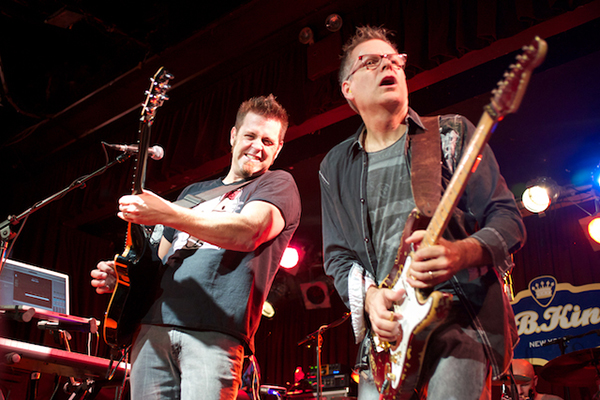
MPc: How do you describe the Spock’s Beard sound to someone who doesn’t know the band yet?
AM: Well, you know, I usually… to most people, I’ll just go, old Yes or Genesis. [laughs] That’s what I say. Because that’s what most people can [understand]—they’ve heard that. Most people of a certain age can know what that means.
There’s really a lot more… there’s a Gentle Giant in there, but most people don’t know who they are [laughs]. Unfortunately, they should, because they were the best. They were awesome.
MPc: Let's talk about vocals and your big, four-part harmonies. How do you go about creating those parts for the songs?
AM: Usually you start with the one main guy. Here’s the main guy and then, okay, then you kind of slot in the other parts.
MPc: Do you write out the parts for you, or do you actually sit there jamming on—you know, you sing a part, you sing a line and then someone else in the band sings along on top of it and…?
AM: Well, again, I don’t think anybody actually writes notes on paper, but you just create it in the studio and you just kind of go, all right, well, you know, if this guy’s doing that, then what would the next guy do? He’d have to… different guys will come in. Usually it’s one person just figures out the different lines, or maybe two, depending on who’s around. But you just kind of go, all right, well, that guy’s doing that and then you have to find another line that fits with that, but the whole idea—it’s like the whole idea of counterpoint going back to Bach and stuff is… the idea is that each piece can stand on its own as a viable melody, ideally. It doesn’t always work out that way, usually there’s one or two parts that are just crazy weird and make no sense on their own. But you’re trying for to have each part make sense by itself and then fit together.
So, you know, you just kind of say, well, okay, this guy’s doing the root, this guy’s doing the fifth and somebody’s got to do the third and you go from there.
MPc: Now, you produced the last album, right?
AM: Yeah, with Rich Mauser and John [Bacon], yeah.
MPc: How do you know when a song’s done?
AM: [laughs] You mean like, recording-wise? Yeah, that’s one of the hardest things, because—especially with all the stuff that we have now and you can keep tweaking it forever and go crazy. It’s very difficult to go, all right, that’s it. We’re not messing with this any more. Yeah, it’s hard. It’s very hard. Because, you know, you get really close in and, from the very beginning, it sounds really close, but there’s always a little more something, something you can put in there, y’know.
MPc: And what are some of your favorite songs to play live? For you, personally?
AM: Like, Spock’s tunes?
MPc: Yes. [laughs]
AM: Well, probably my all-time favorite is “Go The Way You Go.” Because it’s got this big guitar solo at the end and I can ham it up and run around and act stupid. [laughs]
I like doing the ones with the counterpoint stuff and I really like playing “Waiting for Me” off our last record. That one’s really fun. And “Perfect Day.” That’s a really—I like playing that one. I really like doing the acoustic bit in the middle. It’s really fun and people always respond, and that’s fun. There’s a lot of stuff. Mostly, I like playing songs with big guitar solos in them. [laughs]

